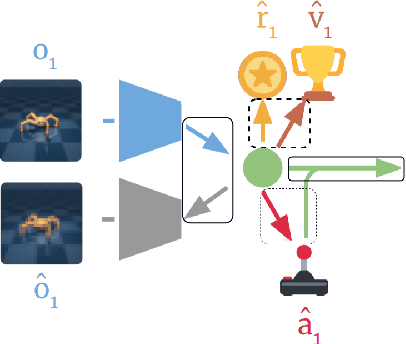Multi-Source Transfer Learning for Deep Model-Based Reinforcement Learning
Paper and Code
May 28, 2022



Recent progress in deep model-based reinforcement learning allows agents to be significantly more sample efficient by constructing world models of high-dimensional environments from visual observations, which enables agents to learn complex behaviours in summarized lower-dimensional spaces. Reusing knowledge from relevant previous tasks is another approach for achieving better data-efficiency, which becomes especially more likely when information of multiple previously learned tasks is accessible. We show that the simplified representations of environments resulting from world models provide for promising transfer learning opportunities, by introducing several methods that facilitate world model agents to benefit from multi-source transfer learning. Methods are proposed for autonomously extracting relevant knowledge from both multi-task and multi-agent settings as multi-source origins, resulting in substantial performance improvements compared to learning from scratch. We introduce two additional novel techniques that enable and enhance the proposed approaches respectively: fractional transfer learning and universal feature spaces from a universal autoencoder. We demonstrate that our methods enable transfer learning from different domains with different state, reward, and action spaces by performing extensive and challenging multi-domain experiments on Dreamer, the state-of-the-art world model based algorithm for visual continuous control tasks.
 Add to Chrome
Add to Chrome Add to Firefox
Add to Firefox Add to Edge
Add to Edge